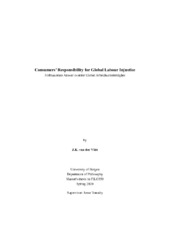| dc.description.abstract | An individual from a relatively affluent country is presumably hardly surprised by hearing about stories that depict global labour injustices. We are aware of the fact that there are people in other countries who work under abhorrent ‘sweatshop’ conditions and we know that these circumstances are still more pervasive than we would like them to be. In this way, global labour injustices amount to a morally unacceptable state of affairs for which there is an urgent need for remedy. What role should an individual play in providing this remedy? In this thesis, I argue that individuals incur remedial responsibility for global labour injustices by virtue of being connected as consumers. I attempt to answer the question whether consumers should consume ethically in order to discharge these responsibilities. First, I discuss accounts of responsibility as put forward by Iris Marion Young and David Miller. Due to dissatisfaction with Young’s account of political responsibility, I adopt Miller’s framework of the connection theory of remedial responsibility. As a result of the application of the connection theory, it appears that corporations are most strongly connected to these injustices. However, given their objectionable inaction as well as their sensitivity to consumer preferences, I argue that a considerable share of remedial responsibility falls on consumers. I then go on to consider whether consumers should discharge their remedial responsibilities through ethical consumerism. Upon first consideration, it seems that consumers should not discharge their remedial responsibility as consumers by attempting to consume ethically in order to affect demand. I conclude that this would be an excessively burdensome as well as inefficacious task. Subsequently, I argue that this reasoning nevertheless presupposes that the only impact consumption choices will have, is by directly affecting consumer demand. This reasoning thereby neglects the normative expressive value of consumption choices. Furthermore, I argue that individual consumers ought to take steps towards collectivisation. Among the steps an individual ought to take is signalling a willingness to come together and act collectively. Ultimately, I conclude that one of the ways individuals can engage in signalling, is by employing the normative expressive function of their consumption choices. | en_US |
